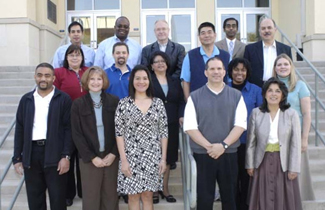Leadership UTSA congratulates first class, welcomes 2010–2011 participants

Graduates of the 2009–2010 Leadership UTSA Program. Front row: Bryan Heard, Audrey Magnuson, Marietta Delarosa, Jim Sarra and Raquel Marquez. Center row: Gayle Nicoll, Eric Cooper, Maricela Oliva, Sonja Lanehart and Misty Kelley. Back row: Joey Ramos, Lowa Mwilambwe, Bob Cardy, Alan Shoho, Bernard Arulanandam and Stathis Michaelides.

Graduates of the 2009–2010 Leadership UTSA Program. Front row: Bryan Heard, Audrey Magnuson, Marietta Delarosa, Jim Sarra and Raquel Marquez. Center row: Gayle Nicoll, Eric Cooper, Maricela Oliva, Sonja Lanehart and Misty Kelley. Back row: Joey Ramos, Lowa Mwilambwe, Bob Cardy, Alan Shoho, Bernard Arulanandam and Stathis Michaelides.
(July 8, 2010)--Cultivating leaders from within the university is the aim of a new program, Leadership UTSA, which recently announced its cohort of participants for the upcoming academic year. The program was developed in 2009 by John Frederick, provost and vice president for academic affairs, and Gage Paine, vice president for student affairs.
"As administrators, we talk about how everyone at UTSA can play a role in our drive to become a premier research university," said Frederick. "The idea for Leadership UTSA originated with some of our faculty members, and we thought it was a great opportunity to engage more of our faculty and staff members in the university's vision."
In 2008, Ann Eisenberg, associate dean of the Honors College; Marcheta Evans, associate dean of the College of Education and Human Development; and Edwin Barea-Rodriguez, chair of the Department of Biology; represented UTSA as participants in the UT System's leadership development program. They returned to San Antonio convinced that UTSA needed a similar program. So Leadership UTSA was created as an opportunity for faculty and staff to develop leadership skills and institutional perspectives.
"Being a leader transcends job title or position, and I believe that it benefits the university to nurture leaders at every level," said Paine. "At the same time, as a leader I also am a learner, and Leadership UTSA gave me and Dr. Frederick a chance to learn from our staff members."
Eight faculty and eight Student Affairs staff members participated in the pilot program in 2009–2010. They attended monthly full-day sessions during the academic year, with session topics ranging from strategic planning to understanding budgets. During the spring semester, each participant shadowed a UTSA administrator in order to observe real-world leadership and discuss issues more fully. In addition, each vice presidential area presented on the responsibilities under their purview to give participants a broader understanding of university programs and services.
"If you're at a departmental level as a faculty member or at a unit level as a staff member, you have responsibilities for a relatively finite part of the institutional function," said Leadership UTSA participant Maricela Oliva, assistant professor in the Department of Educational Leadership and Policy Studies. "You think you understand how it connects to the rest of what happens, but it's good to actually engage others who are performing those other functions."
Her department colleague Professor Alan Shoho added that Leadership UTSA also allowed him to develop strong relationships with his administrative mentor and with faculty from other colleges, which he believes is especially important for a growing university.
"I came to UTSA 16 years ago because I wanted to be part of building something," he said. "Some of my new faculty colleagues here are a little impatient and think we can get from point A to point B overnight. Organizational change doesn't happen overnight, so if I'm a part of that foundation that we're building for the future, that's fine with me."
Because of positive response, Leadership UTSA was expanded to 20 participants for 2010-2011. Faculty selected for the coming year include Carola Wenk, Cory Hallam, John Warren, Judy Teale, Paul Schutz, Roger Enriquez, Stewart Miller and Thelma Duffey. Staff participants will be Beth Manning, Dominique Halaby, Ginnifer Cié Gee, Herb Ganey, Jane Wilcox, Kim Canady, Laura Munroe, Leticia Duncan, Lisa Alonzo, Marisol Scheer, Marlon Anderson and Veronica Ramirez.
"It was a great experience," said Lowa Mwilambwe, director of the University Center and 2009–2010 participant. "I would recommend it to anyone who wants to learn more about leadership theory, more about UTSA, or just to grow professionally and establish ties across the university."
Events
This academically rigorous mathematics-based summer enrichment program prepares middle and high school students for advanced studies in science, technology, engineering and mathematics (STEM). Participants learn about problem-solving systems, develop greater awareness of STEM careers and strengthen their research skills.
UTSA Main CampusArchaeology 101 will introduce campers to archaeology and build on learned skills through experimental activities (like cave painting, weaving, and garbology).
Center for Archaeological Research, UTSA Main CampusThe camp exposes rising high school juniors, rising seniors and incoming college freshman to the many facets of the criminal justice system. Students will have opportunities to learn the functions of police in society and apply scientific theories to criminal investigations by examining a mock crime scene.
UTSA Main CampusThe Academy for Teacher Excellence Research Center invites you to join us for the Summer Bridging Institute. This institute will focus on being lifelong growers and continually seeking to increase our skills as educators.
UTSA Downtown CampusArchaeology 201 will briefly go over the foundations of archaeology and related skills, followed by a different topic over the course of this week (like skeletal analysis, global cultures, and more).
Center for Archaeological Research, UTSA Main CampusCraft a comic to create your own narrative and find your voice through storytelling. Participants will learn to create characters that are self-reflective and through a community lens.
REGSS Community Room (DB 3.202,) UTSA Downtown CampusCome enjoy a discussion on art as a self expression in the age of moving technology and telling your story with a community.
REGSS Community Room (DB 3.202,) UTSA Downtown Campus

